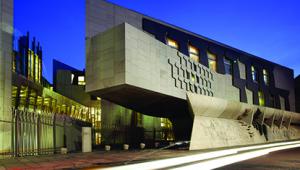Current immigration controls had a “disproportionate” effect on Scotland and the UK government’s “one size fits all” policy held back the country’s ambitions, he told members of the Scottish Parliament’s finance and constitution committee.
“Reducing immigration to the ‘tens of thousands’, as the prime minister has discussed, is singularly unhelpful to Scotland’s economy,” Mackay said. “We need to grow our economy, grow our population, grow our working-age population.”
He added that devolution of immigration powers would boost GDP and tax take, as well as increasing diversity in Scotland’s social fabric.
“Per head for every EU migrant, the net contribution to GDP is something like £30,000, and the fiscal tax take is about £10,000, so drawing up the drawbridge and pulling down the barriers and telling people they’re not welcome is most unhelpful to Scotland’s economic needs,” Mackay said.
“I think the time has come to look again at what further powers Scotland should have. If we collectively accept that there is a challenge to Scotland’s economy, surely it follows that we should have the appropriate levers to put us in a better position.”
The Scottish finance secretary was being questioned on his medium term strategy, which was published last week as the Scottish Fiscal Commission set out its latest forecasts for the economy.
These predicted a £1.7bn reduction in income tax revenues over the next five years on the back of sluggish growth, with Scotland continuing to lag behind the rest of the UK.
The commission warned in its forecast that while the total Scottish population was expected to grow, the working-age population aged 16 to 64 would start to shrink from 2018 onwards.
This was in contrast to a growing working age population in the UK, and placed “a particular drag” on growth in GDP in Scotland.
“Scotland’s population has not been growing as fast as the rest of the UK [and] the key factor that has been driving faster growth in the UK and less growth in Scotland is different levels of in-migration,” SFC commissioner David Wilson told the committee.
He added that the possibility of a tighter immigration regime and changes in behaviour following the Brexit vote meant that average net in-migration to Scotland could fall to 9,000 people a year, compared to the current average of 15,000.
“We felt that was a recognition of the downside risks in terms of Scotland’s population of the vote to leave the EU,” Wilson said.











